Class
AdwToolbarView
since: 1.4
Description [src]
final class Adw.ToolbarView : Gtk.Widget
implements Gtk.Accessible, Gtk.Buildable, Gtk.ConstraintTarget {
/* No available fields */
}A widget containing a page, as well as top and/or bottom bars.
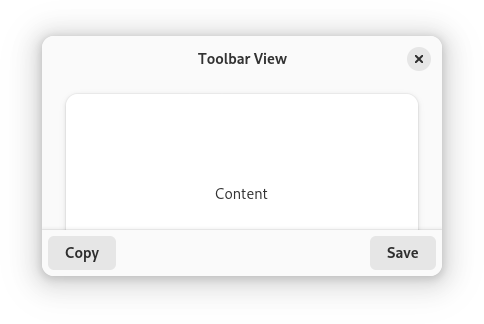
AdwToolbarView has a single content widget and one or multiple top and
bottom bars, shown at the top and bottom sides respectively.
Example of an AdwToolbarView UI definition:
<object class="AdwToolbarView">
<child type="top">
<object class="AdwHeaderBar"/>
</child>
<property name="content">
<object class="AdwPreferencesPage">
<!-- ... -->
</object>
</property>
</object>
The following kinds of top and bottom bars are supported:
AdwHeaderBarAdwTabBarAdwViewSwitcherBarGtkActionBarGtkHeaderBarGtkPopoverMenuBarGtkSearchBar- Any
GtkBoxor a similar widget with the.toolbarstyle class
By default, top and bottom bars are flat and scrolling content has a subtle
undershoot shadow, same as when using the
.undershoot-top and
.undershoot-bottom style
classes. This works well in most cases, e.g. with AdwStatusPage or
AdwPreferencesPage, where the background at the top and bottom parts of
the page is uniform. Additionally, windows with sidebars should always use
this style.
AdwToolbarView:top-bar-style and
AdwToolbarView:bottom-bar-style properties can be used add an opaque
background and a persistent shadow to top and bottom bars, this can be useful
for content such as utility panes,
where some elements are adjacent to the top/bottom bars, or AdwTabView,
where each page can have a different background.
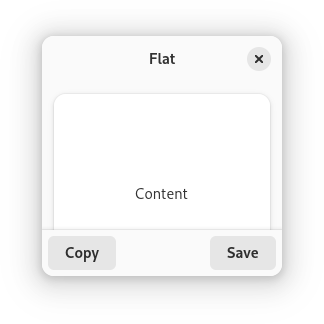
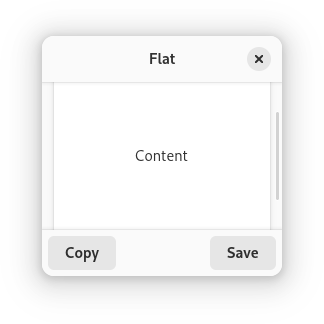
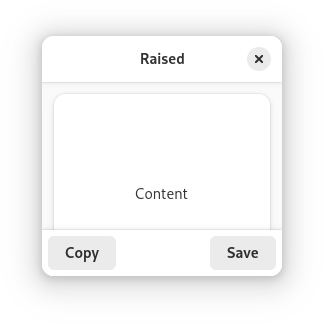
AdwToolbarView ensures the top and bottom bars have consistent backdrop
styles and vertical spacing. For comparison:
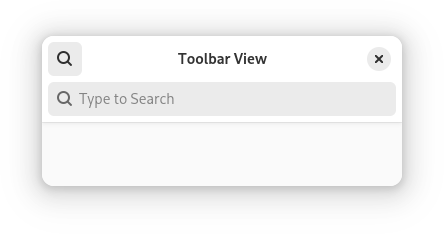
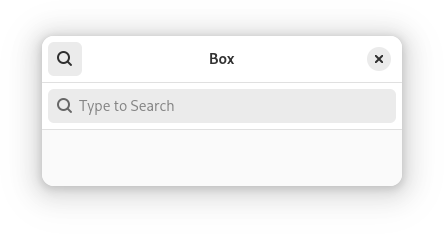
Any top and bottom bars can also be dragged to move the window, equivalent
to putting them into a GtkWindowHandle.
Content is typically place between top and bottom bars, but can also extend
behind them. This is controlled with the
AdwToolbarView:extend-content-to-top-edge and
AdwToolbarView:extend-content-to-bottom-edge properties.
Top and bottom bars can be hidden and revealed with an animation using the
AdwToolbarView:reveal-top-bars and
AdwToolbarView:reveal-bottom-bars properties.
AdwToolbarView as GtkBuildable
The AdwToolbarView implementation of the GtkBuildable interface
supports adding a top bar by specifying “top” as the “type” attribute of a
<child> element, or adding a bottom bar by specifying “bottom”.
Accessibility
AdwToolbarView uses the GTK_ACCESSIBLE_ROLE_GROUP role.
Available since: 1.4
Instance methods
adw_toolbar_view_get_extend_content_to_bottom_edge
Gets whether the content widget can extend behind bottom bars.
since: 1.4
adw_toolbar_view_get_extend_content_to_top_edge
Gets whether the content widget can extend behind top bars.
since: 1.4
adw_toolbar_view_set_extend_content_to_bottom_edge
Sets whether the content widget can extend behind bottom bars.
since: 1.4
adw_toolbar_view_set_extend_content_to_top_edge
Sets whether the content widget can extend behind top bars.
since: 1.4
Methods inherited from GtkAccessible (19)
gtk_accessible_announce
Requests the user’s screen reader to announce the given message.
gtk_accessible_get_accessible_parent
Retrieves the accessible parent for an accessible object.
gtk_accessible_get_accessible_role
Retrieves the accessible role of an accessible object.
gtk_accessible_get_at_context
Retrieves the accessible implementation for the given GtkAccessible.
gtk_accessible_get_bounds
Queries the coordinates and dimensions of this accessible.
gtk_accessible_get_first_accessible_child
Retrieves the first accessible child of an accessible object.
gtk_accessible_get_next_accessible_sibling
Retrieves the next accessible sibling of an accessible object.
gtk_accessible_get_platform_state
Query a platform state, such as focus.
gtk_accessible_reset_property
Resets the accessible property to its default value.
gtk_accessible_reset_relation
Resets the accessible relation to its default value.
gtk_accessible_reset_state
Resets the accessible state to its default value.
gtk_accessible_set_accessible_parent
Sets the parent and sibling of an accessible object.
gtk_accessible_update_next_accessible_sibling
Updates the next accessible sibling of self.
gtk_accessible_update_property
Updates a list of accessible properties.
gtk_accessible_update_property_value
Updates an array of accessible properties.
gtk_accessible_update_relation
Updates a list of accessible relations.
gtk_accessible_update_relation_value
Updates an array of accessible relations.
gtk_accessible_update_state
Updates a list of accessible states. See the GtkAccessibleState
documentation for the value types of accessible states.
gtk_accessible_update_state_value
Updates an array of accessible states.
Methods inherited from GtkBuildable (1)
gtk_buildable_get_buildable_id
Gets the ID of the buildable object.
Properties
Adw.ToolbarView:extend-content-to-bottom-edge
Whether the content widget can extend behind bottom bars.
since: 1.4
Adw.ToolbarView:extend-content-to-top-edge
Whether the content widget can extend behind top bars.
since: 1.4
Properties inherited from GtkWidget (34)
Gtk.Widget:can-focus
Whether the widget or any of its descendents can accept the input focus.
Gtk.Widget:can-target
Whether the widget can receive pointer events.
Gtk.Widget:css-classes
A list of css classes applied to this widget.
Gtk.Widget:css-name
The name of this widget in the CSS tree.
Gtk.Widget:cursor
The cursor used by widget.
Gtk.Widget:focus-on-click
Whether the widget should grab focus when it is clicked with the mouse.
Gtk.Widget:focusable
Whether this widget itself will accept the input focus.
Gtk.Widget:halign
How to distribute horizontal space if widget gets extra space.
Gtk.Widget:has-default
Whether the widget is the default widget.
Gtk.Widget:has-focus
Whether the widget has the input focus.
Gtk.Widget:has-tooltip
Enables or disables the emission of the ::query-tooltip signal on widget.
Gtk.Widget:height-request
Override for height request of the widget.
Gtk.Widget:hexpand
Whether to expand horizontally.
Gtk.Widget:hexpand-set
Whether to use the hexpand property.
Gtk.Widget:layout-manager
The GtkLayoutManager instance to use to compute the preferred size
of the widget, and allocate its children.
Gtk.Widget:margin-bottom
Margin on bottom side of widget.
Gtk.Widget:margin-end
Margin on end of widget, horizontally.
Gtk.Widget:margin-start
Margin on start of widget, horizontally.
Gtk.Widget:margin-top
Margin on top side of widget.
Gtk.Widget:name
The name of the widget.
Gtk.Widget:opacity
The requested opacity of the widget.
Gtk.Widget:overflow
How content outside the widget’s content area is treated.
Gtk.Widget:parent
The parent widget of this widget.
Gtk.Widget:receives-default
Whether the widget will receive the default action when it is focused.
Gtk.Widget:root
The GtkRoot widget of the widget tree containing this widget.
Gtk.Widget:scale-factor
The scale factor of the widget.
Gtk.Widget:sensitive
Whether the widget responds to input.
Gtk.Widget:tooltip-markup
Sets the text of tooltip to be the given string, which is marked up with Pango markup.
Gtk.Widget:tooltip-text
Sets the text of tooltip to be the given string.
Gtk.Widget:valign
How to distribute vertical space if widget gets extra space.
Gtk.Widget:vexpand
Whether to expand vertically.
Gtk.Widget:vexpand-set
Whether to use the vexpand property.
Gtk.Widget:visible
Whether the widget is visible.
Gtk.Widget:width-request
Override for width request of the widget.
Properties inherited from GtkAccessible (1)
Gtk.Accessible:accessible-role
The accessible role of the given GtkAccessible implementation.
Signals
Signals inherited from GtkWidget (13)
GtkWidget::destroy
Signals that all holders of a reference to the widget should release the reference that they hold.
GtkWidget::direction-changed
Emitted when the text direction of a widget changes.
GtkWidget::hide
Emitted when widget is hidden.
GtkWidget::keynav-failed
Emitted if keyboard navigation fails.
GtkWidget::map
Emitted when widget is going to be mapped.
GtkWidget::mnemonic-activate
Emitted when a widget is activated via a mnemonic.
GtkWidget::move-focus
Emitted when the focus is moved.
GtkWidget::query-tooltip
Emitted when the widget’s tooltip is about to be shown.
GtkWidget::realize
Emitted when widget is associated with a GdkSurface.
GtkWidget::show
Emitted when widget is shown.
GtkWidget::state-flags-changed
Emitted when the widget state changes.
GtkWidget::unmap
Emitted when widget is going to be unmapped.
GtkWidget::unrealize
Emitted when the GdkSurface associated with widget is destroyed.
Signals inherited from GObject (1)
GObject::notify
The notify signal is emitted on an object when one of its properties has its value set through g_object_set_property(), g_object_set(), et al.